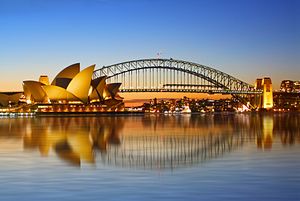Australians are set to benefit from lower interest rates, but despite the end of a mining boom the “Lucky Country” has retained its title as the world’s most expensive nation for the fourth straight year.
According to Deutsche Bank’s “Mapping the World’s Prices 2015” report, Australians currently pay $1.12 in local currency for what would cost a dollar in the United States, narrowly ahead of neighboring New Zealand on $1.11, but well ahead of Asia’s advanced economies such as Japan ($0.85), Hong Kong ($0.73) and Singapore ($0.63). China’s cost of living remains relatively cheap at below 60 cents, with the Philippines around 41 cents, Malaysia 39 cents, Indonesia 32 cents and India a low 28 cents.
Australia would be even more expensive had it not been for a falling exchange rate, which has helped reduce relative prices from $1.63 in 2012, based on purchasing power parity. On Tuesday, the Reserve Bank of Australia (RBA) cut the nation’s official interest rate to a new record low of 2 percent, seeking to prop up an economy hit hard by falling prices of key exports such as coal and iron ore, as well as weak business and government investment.
According to Deutsche Bank, the Australian cities of Sydney and Melbourne ranked the most expensive in the world for public transport, although with relatively inexpensive gym memberships and high taxes on cigarettes at least its citizens have an incentive to stay healthy.
Deutsche Bank’s global strategist Sanjeev Sanyal said the United States rated consistently as the cheapest developed country, with India the most inexpensive major economy, although major differences remained across a range of products.
Apple lovers should buy the iPhone 6 in the United States, likewise Levi’s 501 jeans, which cost around twice the U.S. level in China, Hong Kong and Singapore. Singapore remains “by far” the most expensive place to buy a car, while movie watchers should head to Delhi, Mumbai and Kuala Lumpur but avoid Zurich.
For those seeking an inexpensive weekend getaway, India is the best option, with Sydney among the most expensive due to high hotel room rates, although Tokyo was found to be “surprisingly attractive.”
Big Mac fans should avoid Europe, with Latvia the most expensive at $1.31, while Asia’s cheapest burgers are found in India (39 cents) and Malaysia (44 cents), compared to 93 cents in New Zealand.
Australia also topped the league for two liters of Coca-Cola, with Sydney at 151 percent relative to New York, compared to 93 percent in Hong Kong, 86 percent in Tokyo and just 46 percent in Mumbai. But for Asia’s beer lovers, enjoying a pint in an expatriate bar is more expensive in Singapore (104 percent of New York prices) compared to 77 percent in Hong Kong and Sydney and just 40 percent in Jakarta.
Deutsche Bank Australia chief economist Adam Boyton told the Sydney Morning Herald that Australia had become the world’s most expensive nation since “we’ve gone a very long time now without a serious economic slowdown.”
“In the absence of that, prices have drifted higher over time,” he said. “The surge in commodity prices that had underpinned our economic performance meant we really didn’t have to be efficient. We could just rely on getting paid much more to do the same thing.”
AMP chief economist Shane Oliver told the newspaper that further falls in the Australian dollar would help reduce the cost differential, although ultimately it would come at the cost of lower living standards.
“We’ve dropped the ball in the last 10-15 years,” he said.
Hockey: Go Out And Spend
On Tuesday, the Australian dollar dropped initially after the central bank’s interest rate announcement but then rose more than a cent to 79 cents, despite the RBA’s statement that “further depreciation seems both likely and necessary, particularly given the significant declines in key commodity prices.”
Australian Treasurer Joe Hockey welcomed the rate cut, urging Australian businesses and households to “borrow and invest.”
“We encourage business to go out and spend on productive investments. Small business in particular should take advantage of record low interest rates,” he said in a statement.
Yet with Sydney property prices gaining 14 percent in the year to March 30, analysts warned against cheap money adding fuel to the major city’s housing boom, despite more subdued prices elsewhere.
“Australia has one of the highest household debt levels globally and if low interest rates contribute to higher credit growth, it could drive up household indebtedness from already historically high levels,” Fitch Ratings warned.
For Aussies though, any measure that cuts household costs will come as welcome relief, ahead of a federal budget due May 12 that is expected to show sub-par economic growth continuing into 2016.

































